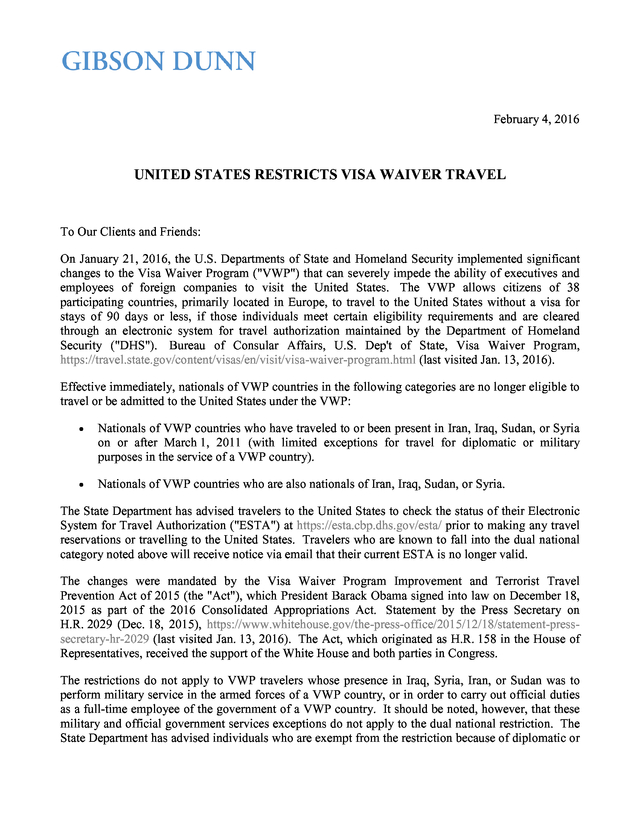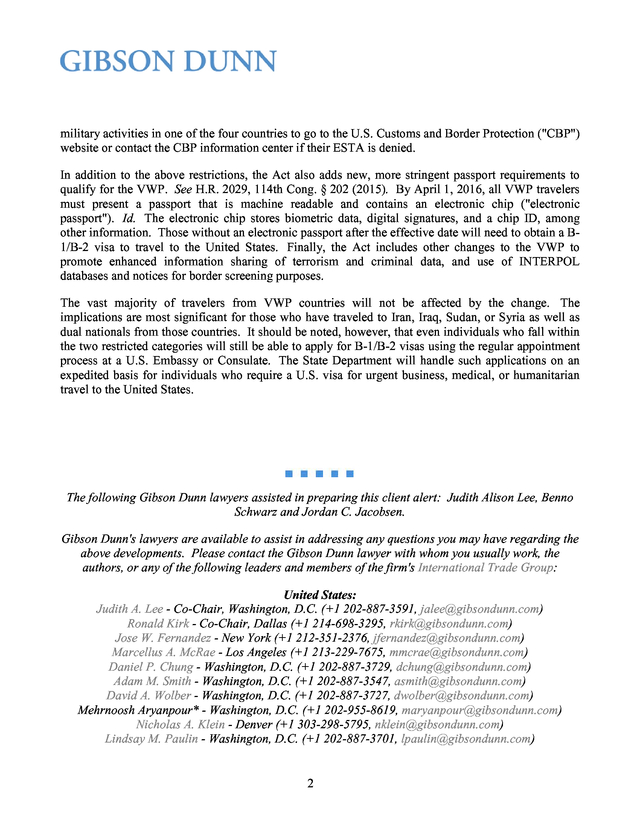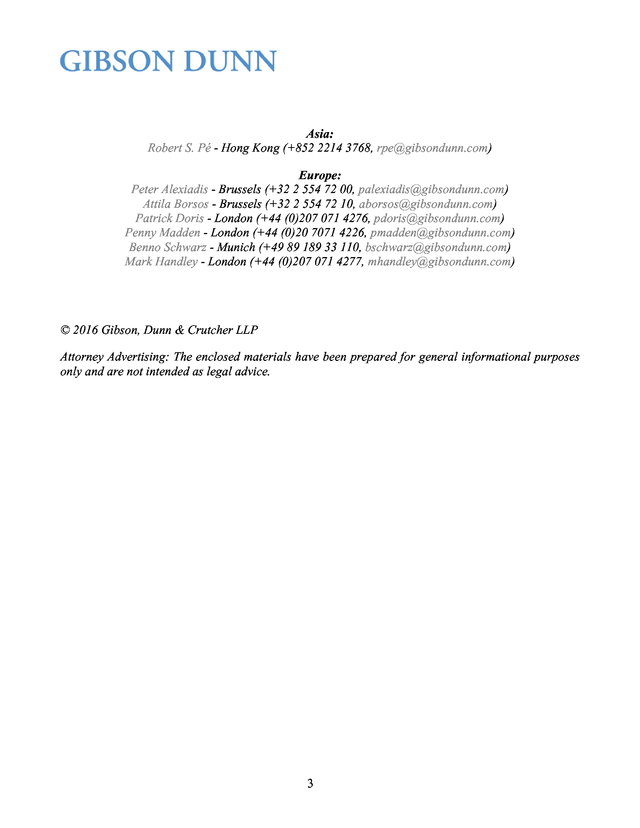Description
February 4, 2016
UNITED STATES RESTRICTS VISA WAIVER TRAVEL
To Our Clients and Friends:
On January 21, 2016, the U.S. Departments of State and Homeland Security implemented significant
changes to the Visa Waiver Program ("VWP") that can severely impede the ability of executives and
employees of foreign companies to visit the United States. The VWP allows citizens of 38
participating countries, primarily located in Europe, to travel to the United States without a visa for
stays of 90 days or less, if those individuals meet certain eligibility requirements and are cleared
through an electronic system for travel authorization maintained by the Department of Homeland
Security ("DHS"). Bureau of Consular Affairs, U.S.
Dep't of State, Visa Waiver Program, https://travel.state.gov/content/visas/en/visit/visa-waiver-program.html (last visited Jan. 13, 2016). Effective immediately, nationals of VWP countries in the following categories are no longer eligible to travel or be admitted to the United States under the VWP: • Nationals of VWP countries who have traveled to or been present in Iran, Iraq, Sudan, or Syria on or after March 1, 2011 (with limited exceptions for travel for diplomatic or military purposes in the service of a VWP country). • Nationals of VWP countries who are also nationals of Iran, Iraq, Sudan, or Syria. The State Department has advised travelers to the United States to check the status of their Electronic System for Travel Authorization ("ESTA") at https://esta.cbp.dhs.gov/esta/ prior to making any travel reservations or travelling to the United States. Travelers who are known to fall into the dual national category noted above will receive notice via email that their current ESTA is no longer valid. The changes were mandated by the Visa Waiver Program Improvement and Terrorist Travel Prevention Act of 2015 (the "Act"), which President Barack Obama signed into law on December 18, 2015 as part of the 2016 Consolidated Appropriations Act.
Statement by the Press Secretary on H.R. 2029 (Dec. 18, 2015), https://www.whitehouse.gov/the-press-office/2015/12/18/statement-presssecretary-hr-2029 (last visited Jan.
13, 2016). The Act, which originated as H.R. 158 in the House of Representatives, received the support of the White House and both parties in Congress. The restrictions do not apply to VWP travelers whose presence in Iraq, Syria, Iran, or Sudan was to perform military service in the armed forces of a VWP country, or in order to carry out official duties as a full-time employee of the government of a VWP country.
It should be noted, however, that these military and official government services exceptions do not apply to the dual national restriction. The State Department has advised individuals who are exempt from the restriction because of diplomatic or . military activities in one of the four countries to go to the U.S. Customs and Border Protection ("CBP") website or contact the CBP information center if their ESTA is denied. In addition to the above restrictions, the Act also adds new, more stringent passport requirements to qualify for the VWP. See H.R. 2029, 114th Cong.
§ 202 (2015). By April 1, 2016, all VWP travelers must present a passport that is machine readable and contains an electronic chip ("electronic passport"). Id.
The electronic chip stores biometric data, digital signatures, and a chip ID, among other information. Those without an electronic passport after the effective date will need to obtain a B1/B-2 visa to travel to the United States. Finally, the Act includes other changes to the VWP to promote enhanced information sharing of terrorism and criminal data, and use of INTERPOL databases and notices for border screening purposes. The vast majority of travelers from VWP countries will not be affected by the change.
The implications are most significant for those who have traveled to Iran, Iraq, Sudan, or Syria as well as dual nationals from those countries. It should be noted, however, that even individuals who fall within the two restricted categories will still be able to apply for B-1/B-2 visas using the regular appointment process at a U.S. Embassy or Consulate.
The State Department will handle such applications on an expedited basis for individuals who require a U.S. visa for urgent business, medical, or humanitarian travel to the United States. The following Gibson Dunn lawyers assisted in preparing this client alert: Judith Alison Lee, Benno Schwarz and Jordan C. Jacobsen. Gibson Dunn's lawyers are available to assist in addressing any questions you may have regarding the above developments.
Please contact the Gibson Dunn lawyer with whom you usually work, the authors, or any of the following leaders and members of the firm's International Trade Group: United States: Judith A. Lee - Co-Chair, Washington, D.C. (+1 202-887-3591, jalee@gibsondunn.com) Ronald Kirk - Co-Chair, Dallas (+1 214-698-3295, rkirk@gibsondunn.com) Jose W.
Fernandez - New York (+1 212-351-2376, jfernandez@gibsondunn.com) Marcellus A. McRae - Los Angeles (+1 213-229-7675, mmcrae@gibsondunn.com) Daniel P. Chung - Washington, D.C.
(+1 202-887-3729, dchung@gibsondunn.com) Adam M. Smith - Washington, D.C. (+1 202-887-3547, asmith@gibsondunn.com) David A.
Wolber - Washington, D.C. (+1 202-887-3727, dwolber@gibsondunn.com) Mehrnoosh Aryanpour* - Washington, D.C. (+1 202-955-8619, maryanpour@gibsondunn.com) Nicholas A.
Klein - Denver (+1 303-298-5795, nklein@gibsondunn.com) Lindsay M. Paulin - Washington, D.C. (+1 202-887-3701, lpaulin@gibsondunn.com) 2 .
Asia: Robert S. Pé - Hong Kong (+852 2214 3768, rpe@gibsondunn.com) Europe: Peter Alexiadis - Brussels (+32 2 554 72 00, palexiadis@gibsondunn.com) Attila Borsos - Brussels (+32 2 554 72 10, aborsos@gibsondunn.com) Patrick Doris - London (+44 (0)207 071 4276, pdoris@gibsondunn.com) Penny Madden - London (+44 (0)20 7071 4226, pmadden@gibsondunn.com) Benno Schwarz - Munich (+49 89 189 33 110, bschwarz@gibsondunn.com) Mark Handley - London (+44 (0)207 071 4277, mhandley@gibsondunn.com) © 2016 Gibson, Dunn & Crutcher LLP Attorney Advertising: The enclosed materials have been prepared for general informational purposes only and are not intended as legal advice. 3 .
Dep't of State, Visa Waiver Program, https://travel.state.gov/content/visas/en/visit/visa-waiver-program.html (last visited Jan. 13, 2016). Effective immediately, nationals of VWP countries in the following categories are no longer eligible to travel or be admitted to the United States under the VWP: • Nationals of VWP countries who have traveled to or been present in Iran, Iraq, Sudan, or Syria on or after March 1, 2011 (with limited exceptions for travel for diplomatic or military purposes in the service of a VWP country). • Nationals of VWP countries who are also nationals of Iran, Iraq, Sudan, or Syria. The State Department has advised travelers to the United States to check the status of their Electronic System for Travel Authorization ("ESTA") at https://esta.cbp.dhs.gov/esta/ prior to making any travel reservations or travelling to the United States. Travelers who are known to fall into the dual national category noted above will receive notice via email that their current ESTA is no longer valid. The changes were mandated by the Visa Waiver Program Improvement and Terrorist Travel Prevention Act of 2015 (the "Act"), which President Barack Obama signed into law on December 18, 2015 as part of the 2016 Consolidated Appropriations Act.
Statement by the Press Secretary on H.R. 2029 (Dec. 18, 2015), https://www.whitehouse.gov/the-press-office/2015/12/18/statement-presssecretary-hr-2029 (last visited Jan.
13, 2016). The Act, which originated as H.R. 158 in the House of Representatives, received the support of the White House and both parties in Congress. The restrictions do not apply to VWP travelers whose presence in Iraq, Syria, Iran, or Sudan was to perform military service in the armed forces of a VWP country, or in order to carry out official duties as a full-time employee of the government of a VWP country.
It should be noted, however, that these military and official government services exceptions do not apply to the dual national restriction. The State Department has advised individuals who are exempt from the restriction because of diplomatic or . military activities in one of the four countries to go to the U.S. Customs and Border Protection ("CBP") website or contact the CBP information center if their ESTA is denied. In addition to the above restrictions, the Act also adds new, more stringent passport requirements to qualify for the VWP. See H.R. 2029, 114th Cong.
§ 202 (2015). By April 1, 2016, all VWP travelers must present a passport that is machine readable and contains an electronic chip ("electronic passport"). Id.
The electronic chip stores biometric data, digital signatures, and a chip ID, among other information. Those without an electronic passport after the effective date will need to obtain a B1/B-2 visa to travel to the United States. Finally, the Act includes other changes to the VWP to promote enhanced information sharing of terrorism and criminal data, and use of INTERPOL databases and notices for border screening purposes. The vast majority of travelers from VWP countries will not be affected by the change.
The implications are most significant for those who have traveled to Iran, Iraq, Sudan, or Syria as well as dual nationals from those countries. It should be noted, however, that even individuals who fall within the two restricted categories will still be able to apply for B-1/B-2 visas using the regular appointment process at a U.S. Embassy or Consulate.
The State Department will handle such applications on an expedited basis for individuals who require a U.S. visa for urgent business, medical, or humanitarian travel to the United States. The following Gibson Dunn lawyers assisted in preparing this client alert: Judith Alison Lee, Benno Schwarz and Jordan C. Jacobsen. Gibson Dunn's lawyers are available to assist in addressing any questions you may have regarding the above developments.
Please contact the Gibson Dunn lawyer with whom you usually work, the authors, or any of the following leaders and members of the firm's International Trade Group: United States: Judith A. Lee - Co-Chair, Washington, D.C. (+1 202-887-3591, jalee@gibsondunn.com) Ronald Kirk - Co-Chair, Dallas (+1 214-698-3295, rkirk@gibsondunn.com) Jose W.
Fernandez - New York (+1 212-351-2376, jfernandez@gibsondunn.com) Marcellus A. McRae - Los Angeles (+1 213-229-7675, mmcrae@gibsondunn.com) Daniel P. Chung - Washington, D.C.
(+1 202-887-3729, dchung@gibsondunn.com) Adam M. Smith - Washington, D.C. (+1 202-887-3547, asmith@gibsondunn.com) David A.
Wolber - Washington, D.C. (+1 202-887-3727, dwolber@gibsondunn.com) Mehrnoosh Aryanpour* - Washington, D.C. (+1 202-955-8619, maryanpour@gibsondunn.com) Nicholas A.
Klein - Denver (+1 303-298-5795, nklein@gibsondunn.com) Lindsay M. Paulin - Washington, D.C. (+1 202-887-3701, lpaulin@gibsondunn.com) 2 .
Asia: Robert S. Pé - Hong Kong (+852 2214 3768, rpe@gibsondunn.com) Europe: Peter Alexiadis - Brussels (+32 2 554 72 00, palexiadis@gibsondunn.com) Attila Borsos - Brussels (+32 2 554 72 10, aborsos@gibsondunn.com) Patrick Doris - London (+44 (0)207 071 4276, pdoris@gibsondunn.com) Penny Madden - London (+44 (0)20 7071 4226, pmadden@gibsondunn.com) Benno Schwarz - Munich (+49 89 189 33 110, bschwarz@gibsondunn.com) Mark Handley - London (+44 (0)207 071 4277, mhandley@gibsondunn.com) © 2016 Gibson, Dunn & Crutcher LLP Attorney Advertising: The enclosed materials have been prepared for general informational purposes only and are not intended as legal advice. 3 .















